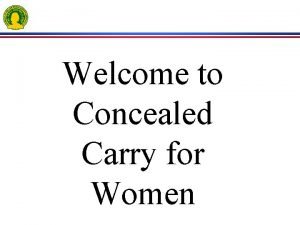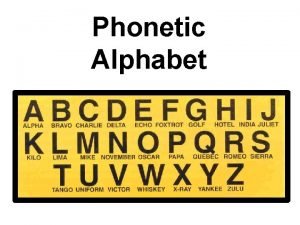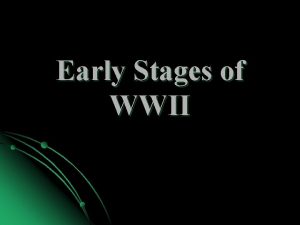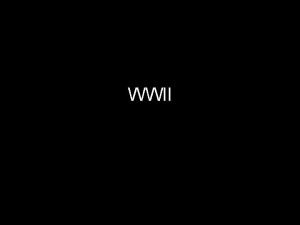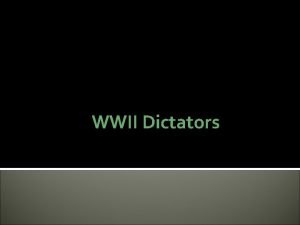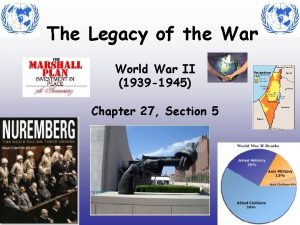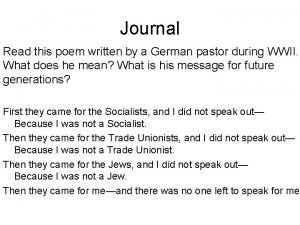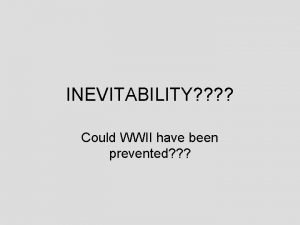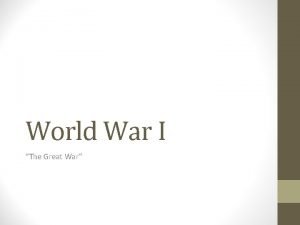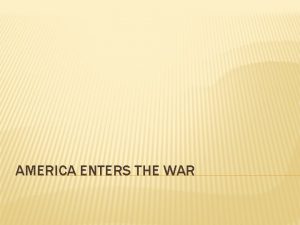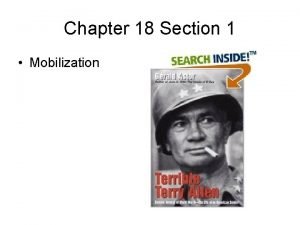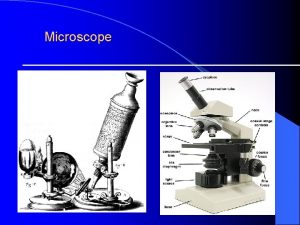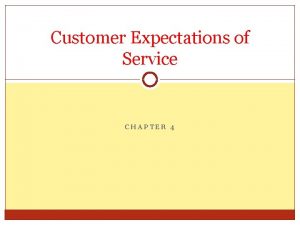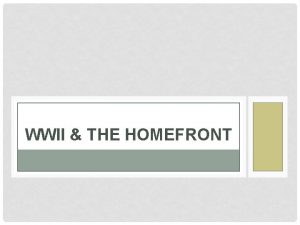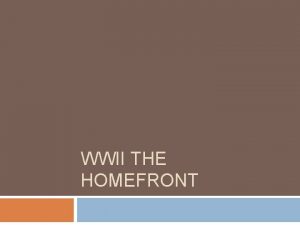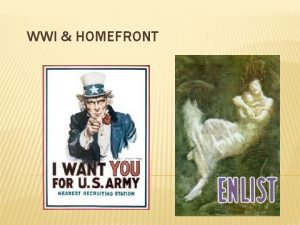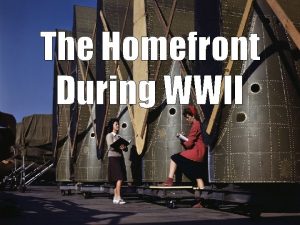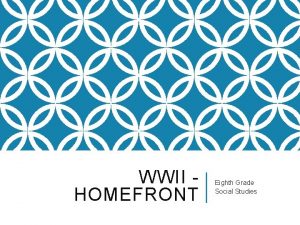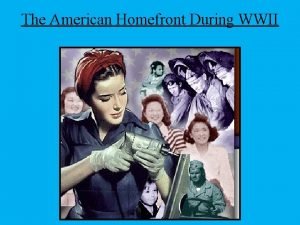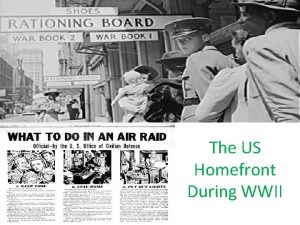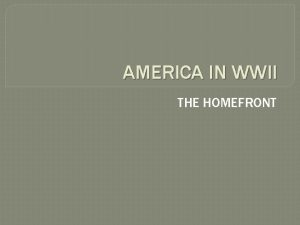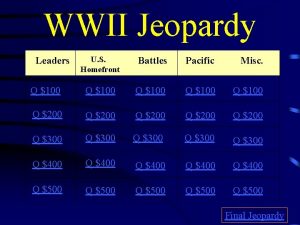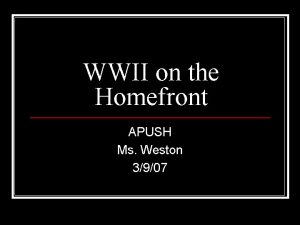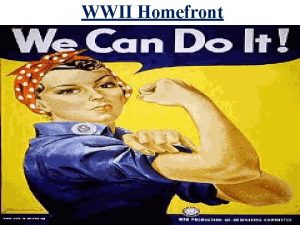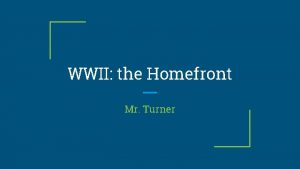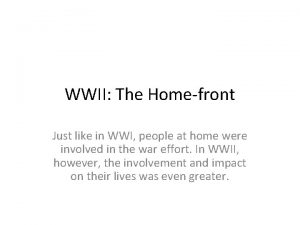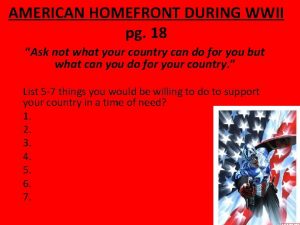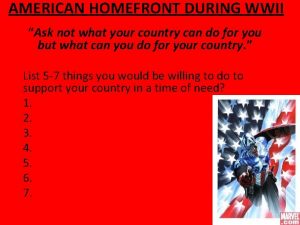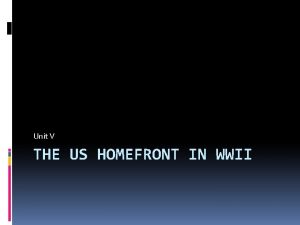WWII On The Homefront Selective Service and the































- Slides: 31

WWII On The Homefront

Selective Service and the GI • After Pearl Harbor, 5 million men volunteer for military service • 10 million more drafted to meet needs of two-front war

Is the draft constitutional? Three provisions of the Constitution are relevant: 1. Article 1, sec. 8, cl. 12: Congress shall have the power to raise and support armies. . . 2. Amendment 1: Congress shall make no law respecting an establishment of religion, or prohibiting the free exercise thereof; 3. Amendment 13: Neither slavery nor involuntary servitude, except as a punishment for crime whereof the party shall have been duly convicted, shall exist within the United States. Explain how each provision is relevant to the question. Taken together, how do the provisions answer the question? US Constitution. net

Dramatic Contributions • 300, 000 Mexican Americans join armed forces • 1 million African Americans serve; live, work in segregated units • 13, 000 Chinese Americans and 33, 000 Japanese Americans serve • 25, 000 Native Americans enlist

During World War II, when China and the United States were allies, President Franklin D. Roosevelt signed an "Act to Repeal the Chinese Exclusion Acts, to Establish Quotas, and for Other Purposes" This Act of December 13, 1943 also lifted restrictions on naturalization.

German soldiers during World War I had been befuddled by Indians who transmitted messages over field phones in the Choctaw language. During World War II, the U. S. Marine Corps recruited Navajo Indians for the same purpose. Navajo marines used their language as a battlefield code that the Japanese never broke. The Navajo Code Talkers became the most celebrated and publicized of the radio units.

The Industrial Response • Factories convert from civilian to war production • Shipyards, defense plants expand, new ones built • Produce ships, arms rapidly - use prefabricated parts - people work at record speeds

Nearly 18 million workers in war industries; 6 million are women Rosie the Riveter 2: 19

Economic Gains • Defense industries boom, unemployment falls to 1. 2% in 1944 - average pay rises 10% during war • Farmers prosper from rising crop prices, increase in production - many pay off mortgages • Percentage of women in work force rises to 35%

Federal spending increased from $9. 4 billion in 1939 to $95. 2 billion min 1945. Gross Domestic Product more than doubled. The cost to the federal government was about $321 billion, ten times as much as WWI.

Financing the War Higher taxes paid for about 41% of the war. The number of Americans who paid income taxes rose from 13 million to 50 million. Start of withholding income taxes from paychecks. The marginal tax rate was 94% Gov’t borrowed the rest of the money from banks, private investors, and the public through war bonds.

The deficit spending advocated by John Maynard Keynes turned the economy around overnight. Told you so!


What Can I Do? Issued By The Office Of Civilian Defense 1942

As America entered World War II, it began a massive buildup of weaponry and war-related materials. Since many of the materials used in the production of weapons and other items for the military were also used in consumer goods, the government looked for ways to encourage people to sacrifice material comforts to help maximize wartime production. The following is part of a pamphlet issued by the Office of Civilian Defense, an agency of the federal government.

War changes the pattern of our lives. It cannot change our way of life, unless we are beaten. The kids still play baseball in the corner lot—but they knock off early to weed the victory garden, cart scrap paper to the salvage center, carry home the groceries that used to be delivered. The factory whistle blows—but it calls three shifts of workers instead of one. The daily paper still has comics, but it’s the front page that carries the answer to the urgent question “how are we doing? ” All over America there’s a new tempo, a new purpose, a new spirit.

Hard work isn’t bad—it’s a badge of courage. That “old clothes look” doesn’t matter. It’s smart to be mended. “Sorry m’am, we can’t get any more of those. ” Good! That means materials are going where they belong—into war weapons. Only one thing worries us. “I’m too old to fight!” “I’m too young to fight!” “I’m busy all day cooking and cleaning and mending. ”… But this is your war—and your part in it is clear. You don’t need spare time. You need imagination to see the connection between tasks which to you may seem small and unimportant—and winning the war. You need understanding, resourcefulness, selfdiscipline, determination, and love of America. …

Conservation is a war weapon in the hands of every man, woman, and child. And here are two simple rules for using your weapon:

1. Get along with less—Every time you decide not to buy something, you help to win the war. Be tough with yourself in making each decision. Luxuries are out, and lots of things we used to think of as necessities begin to look like luxuries as we get more and more war-minded.

2. Take good care of the things you have. Most of the comforts and conveniences you now enjoy will have to last you for the duration. It’s only common sense to make them last as long as possible. But there is no need to become frantic about your possessions, or to attach too much importance to them. That kind of thinking leads to a wild scramble for possessions and then to hoarding. In wartime, hoarders are on the same level as spies; both help the enemy.

War production goes faster when home life runs smoothly, and so it is a good idea to keep our homes and personal possessions in good order and repair. Do it now—don’t wait until your things are past repairing. The more shipshape and tidy we keep our homes and personal possessions the less we will feel the need to buy new things.

Most people understand the why of conservation, but they want to know how—how to get on without, how to use less so as to contribute to the war supply, how to save, substitute, and salvage. Here are some of the “hows. ” Consider, for example, a material so scarce that civilians will not get any more of it for the duration—rubber. Rubber is high up on the list of things we must contribute to the war.

We have been slow in changing our driving habits. Toll-bridge receipts were higher in January 1942 than in January 1941. This news must have pleased Hitler. It is bad news for Americans—as bad as losing a battle. We are beginning to do much better. Pleasure riding is out for the duration. As of today we must pool our cars for necessary use, for driving to work, to school, to the shops. We must share necessary rides with our friends and neighbors so that no car goes on the road with even one empty seat. The empty seat is a gift to Hitler. …

Make a thorough search of your closets, attic, cellar, and garage. You will be surprised at the amount of useless metal, rubber, rags, and paper that can be salvaged. Have a special place to put each kind of salvaged material. The children can help. …

V-HOMES Millions of Americans are fighting this war in their homes every day in the week, every week in the year. They are doing millions of hard jobs, full chores, making millions of small sacrifices. They are saving and salvaging, conserving and converting. They are foregoing small pleasures, putting up with inconveniences and annoyances. They are doing these things freely and gladly because they understand the meaning of their fight for freedom: freedom for themselves, their children, and the America they love.

These steadfast and devoted people receive no medals, no citations. They do not ask for recognition, but they deserve it, not only in justice to them, but as an incentive to go on working for victory. The road is long and hard, and all of us need cheer and encouragement.

The V-Home award is a badge of honor for those families which have made themselves into a fighting unit on the home front. If you and your family have earned such an award, you are entitled to put the V-Home certificate in your window. You will receive the award from your local Defense Council. If you and your family have not yet enlisted on the home front you can join today—the greatest civilian army in American history. The V-Home certificate means something: it has to be earned. This is what it says:

THIS IS A V-HOME! We in this home are fighting. We know this war will be easy to lose and hard to win. We mean to win it. Therefore we solemnly pledge all our energies and all our resources to fight for freedom and against fascism. We serve notice to all that we are personally carrying the fight to the enemy, in these ways: I. This home follows the instructions of its air-raid warden, in order to protect itself against attack by air.

II. This home conserves food, clothing, transportation, and health, in order to hasten an unceasing flow of war materials to our men at the front.

III. This home salvages essential materials, in order that they may be converted to immediate war uses. IV. This home refuses to spread rumors designed to divide our Nation. V. This home buys War Savings Stamps and Bonds regularly. We are doing these things because we must to Win This War.

We have been at war for 10 years. What sacrifices have you been asked to make? What sacrifices should we make? Consider this view: Remembering A Nation At War 7: 17
 Homefront revolution holster weapon
Homefront revolution holster weapon Homefront wsgc
Homefront wsgc Nblockers
Nblockers Wwii military alphabet
Wwii military alphabet Advances in technology during wwii
Advances in technology during wwii Define nye committee
Define nye committee Wwii picture
Wwii picture Wwii picture
Wwii picture Ww2 study guide answer key
Ww2 study guide answer key Effects of world war 2
Effects of world war 2 Wwii show
Wwii show Wwii
Wwii Causes of wwii
Causes of wwii German aggression september 1938
German aggression september 1938 Wwii
Wwii Could wwii have been prevented
Could wwii have been prevented Wwii test review
Wwii test review Ww2 apush dbq
Ww2 apush dbq Unrestricted submarine warfare
Unrestricted submarine warfare Selective service
Selective service Selective service
Selective service Difference selective and differential media
Difference selective and differential media Mac plate results
Mac plate results Difference between differential and selective media
Difference between differential and selective media Selective and differential media
Selective and differential media Viable count technique
Viable count technique Pengertian perhatian psikologi
Pengertian perhatian psikologi Adequate service expectations examples
Adequate service expectations examples Evolution of soa
Evolution of soa Selective mutism in adults
Selective mutism in adults Selective breeding animals
Selective breeding animals Vibrio cholerae stool microscopy
Vibrio cholerae stool microscopy
